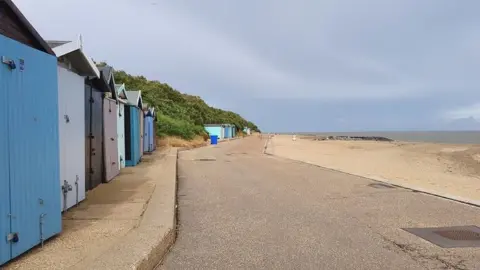Essex: Anglian Water considers desalination plant for Holland-on-Sea
 Helen Steed/Geograph
Helen Steed/GeographSea water could be used as a "last resort" to boost water supply in Essex.
Anglian Water said it was considering installing desalination technology at Holland-on-Sea, Clacton, to help make up for a shortage in water.
It comes amid fears about reduced groundwater abstraction in the area by 2050, with local towns facing growth and abstraction-licence reductions.
Sites in Lincolnshire, Norfolk and Suffolk are also being considered as locations for desalination plants.
Anglian Water anticipates that by 2050, its Essex Central area will have about 85% less water available with an expected 11% increase in the population. Essex South is expected to see a reduction in available water of more than 50%, with the population forecast to grow by nearly 20%.
Dr Geoff Darch, head of supply-demand strategy at Anglian Water, told the Essex Climate Action Commission: "If we do need to go to desalination, we are not going to put a spade in the ground until at least 2030.
"So we have the next four or five years to really think through what does a 21st-century desalination plant look like, on energy and how we deal with the waste streams, and so on.
"The big unknown is how significantly we will have to reduce groundwater abstraction by 2050.
"We are looking at that first before desalination. We are very much seeing desalination as a last option."
Mablethorpe in Lincolnshire, Caister-on-Sea in Norfolk and Felixstowe in Suffolk are also under consideration for desalination plants, according to the Local Democracy Reporting Service.
The plants can have a negative environmental impact due to the large amount of energy consumption required to run them.
More than 300 million people around the world rely on desalinated water, according to the International Desalination and Reuse Association. This water is supplied by more than 21,000 plants - almost twice as many as there were 10 years ago.

Find BBC News: East of England on Facebook, Instagram and X. If you have a story suggestion email [email protected]
